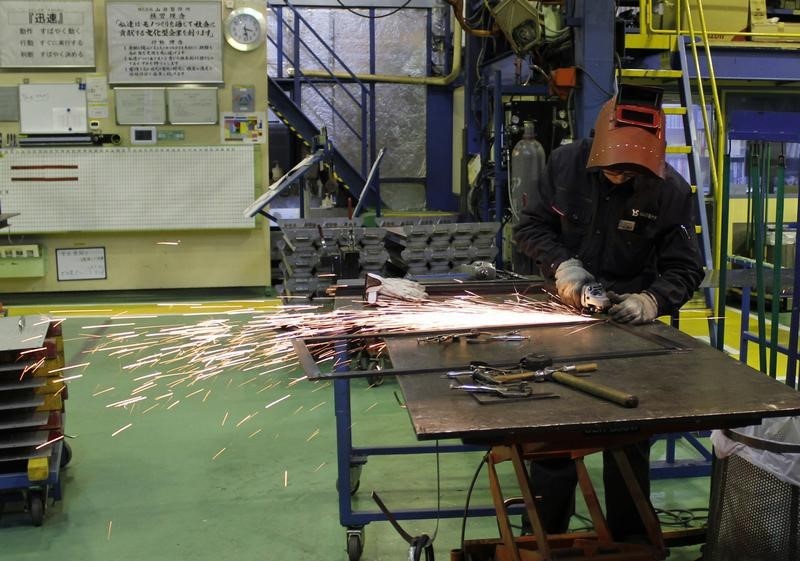By Leika Kihara and Tetsushi Kajimoto
TOKYO (Reuters) - Japanese business sentiment improved to levels not seen since before the economy slipped into recession last year, offering relief to policymakers keen to keep the recovery intact without additional stimulus.
Big companies plan to increase capital expenditure at the fastest pace in a decade, the Bank of Japan's closely watched "tankan" survey showed on Wednesday, a welcome sign for premier Shinzo Abe's economic revival strategy which has seen limited success in nudging firms to boost wages and investment.
The upbeat data should ease pressure on the BOJ to expand monetary stimulus further even though inflation remains distant from its ambitious 2 percent target, analysts say.
"The tankan shows more monetary easing is not necessary, because there really isn't anything bad in this data," said Hiroaki Muto, senior economist at Sumitomo Mitsui Asset Management.
"Japan's economy is improving quicker than I expected. Overseas and domestic demand are both doing well," Muto said.
Analysts say an expected downturn in growth in the second quarter may quickly be unwound through the next six months if companies follow through on their investment plans.
The headline index measuring big manufacturers' sentiment rose 3 points from three months ago to plus 15 in June, beating a median market forecast of plus 12 and improving for the first time in three quarters.
It hit the highest level since March 2014, when consumption boomed ahead of a sales tax hike in April of that year. The knock from the higher levy drove the economy into a mild recession last year.
The mood among big service-sector firms improved by 4 points to plus 23, beating market forecasts and rising for three straight quarters to reach a level last seen in March 2014.
In a sign the benefits of Abe's stimulus policies are broadening, small and midsize hotel and restaurant operators' sentiment turned positive for the first time since relevant data became available in 2004.
"An increase in the number of foreign visitors to Japan seems to have brightened sentiment among retailers, restaurants and hotels," said Hideaki Kikuchi, an economist at Japan Research Institute.
STRONG CAPEX PLANS
The tankan also showed that companies, after sitting on their huge pile of cash for decades on pessimism over the economic outlook, are finally starting to invest.
Big firms plan to raise capital expenditure by 9.3 percent in the fiscal year from April, the survey showed, beating a 5.2 percent increase expected by analysts.
If companies do increase capital expenditure at that pace, it will be the biggest rise since fiscal 2006, the BOJ said.
"We're seeing companies spend more to enhance their plants' productivity or renovate equipment," Ko Nakayama, head of the BOJ's economic stastistics division, told a briefing.
BOJ policymakers will scrutinise the tankan, regarded as among the most comprehensive gauges of the economy given its large sample base, when they meet for a rate review later this month.

The survey results come on top of a recent batch of mixed data. While consumer spending and capital expenditure grew, soft exports and output have heightened the chance the economy may have hit a temporary soft patch in the second quarter.